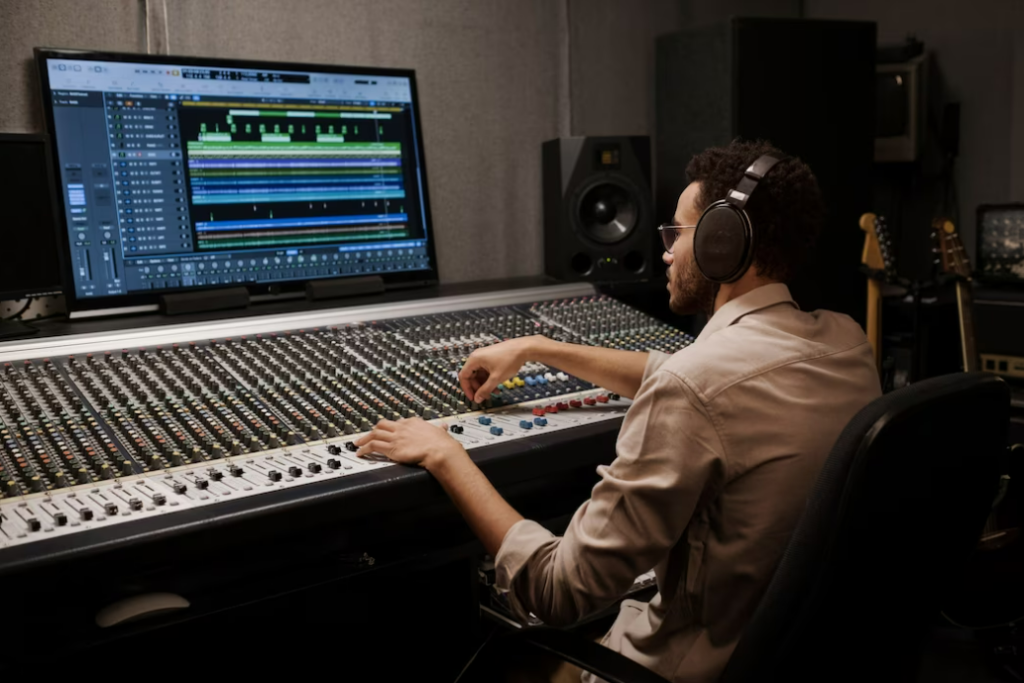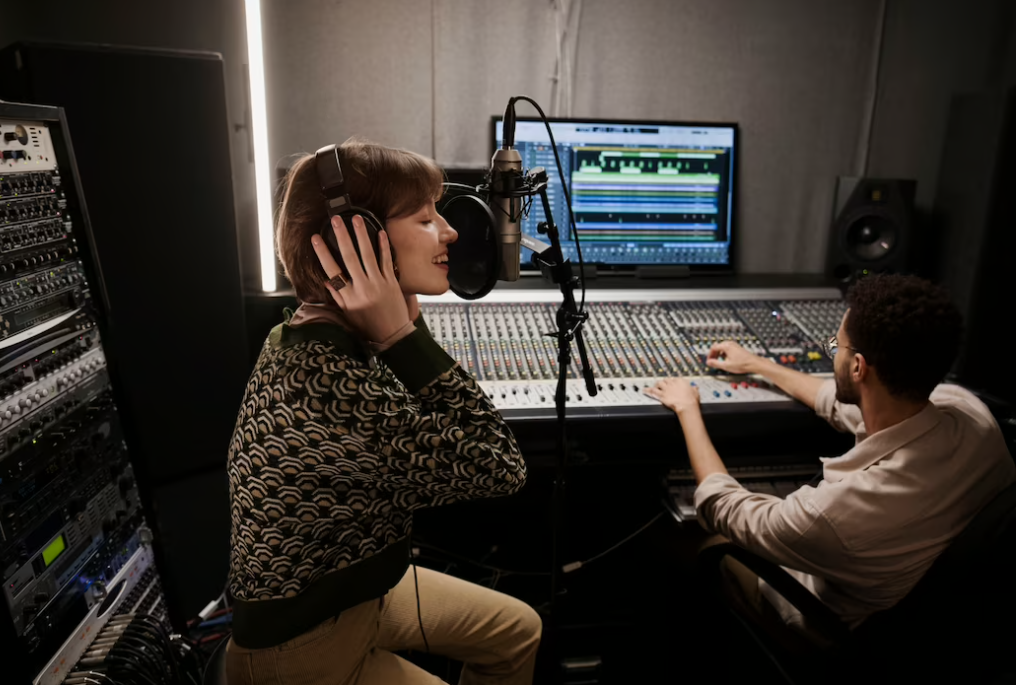Are you a person who enjoys the technical and mechanical part of the job more than a normal day’s work? If ‘Yes’ is your answer, this job is for you.
Sound Engineers normally look up the technical and mechanical parts of the work. Remember, sound engineering is not about looking after audio mixing, sound recording and reproducing sound. It is solely about looking after the technical part required to make a piece of music.
What Traits Should You Ideally Have as a Sound Engineer?
Some of the personality traits and qualities that can help you in excelling as a sound engineer are:
1. Patience: Sound engineering requires you to be tolerant and patient, as a minor mistake can make the entire project go wrong. You need to pay attention to even the minutest details in order to achieve perfection.
2. Excellent Sense of Hearing: You need to have a good sense of hearing and be able to differentiate between the various audio levels. You must also be able to identify any sound-related issues quickly.
3. Creativity: Apart from technical skills, a sound engineer should also have the creativity to mix and manipulate sounds in order to achieve desired results. It includes coming up with new ideas, remixing sounds and fine-tuning them to create a unique sound.
4. Mindful of Safety: Safety is an important consideration for sound engineers, as it involves working with electricity and operating equipment. For example, wiring and connecting electrical cables need to be done carefully.
5. Resourceful for Minimalist Productions: Sound engineers should also be resourceful in order to produce great sound with limited resources and budget. To produce the sound of breaking glass, for example, the engineer may need to use alternate objects like dropping rocks into a metal bucket.
6. Responsible and Composed: Sound engineers are responsible for the quality of sound in any production. They need to be composed and maintain their composure when dealing with a difficult situation.
7. Resilience to Failures: Leading a production (live or not) is a big responsibility – and mistakes are bound to happen. A sound engineer should have the resilience to bounce back from failures and mistakes.
8. Trustworthy and Reliable: Sound engineers need to be trustworthy and reliable as they will have access to sensitive audio equipment. A responsible sound engineer should never misuse any of the resources available at their disposal.
Moreover, when you are the one responsible for sound effects and music in a live production, you will also need to have the ability to coordinate with other crew members on the job.
9. Punctual: Sound engineers need to be punctual and stick to the timeline. They should make sure that their setup is completed within the designated time frame so as not to delay other crew members.
10. Open-Minded Yet Decisive: Audio engineers should have an open-mindedness to try out new techniques and ideas but be decisive in the execution. Innovative ideas can take a production to the next level, but it is important to make sure that they are tried and tested properly.
What Skills Should a Sound Engineer Have?
Sound Engineers need to possess a variety of skills in order to be successful. They must have the ability to comprehend and interpret complicated technical diagrams, understand electronics and various electronic components, as well as being able to use computers for programming and operating machines.

In addition, Sound Engineers should ideally have an aptitude for problem-solving, be able to communicate effectively with colleagues and clients, have excellent organizational skills and demonstrate a good working knowledge of sound recording equipment.
Sound Engineers should also be passionate about music and the audio industry in order to excel in their chosen field. They must have meticulous attention to detail in order to ensure that the technical aspects of sound engineering are carried out correctly and efficiently.
Overall, Sound Engineers need to be creative and highly motivated individuals who are able to meet tight deadlines in order to produce the highest quality results. With the right mix of technical and creative skills, you could soon become a successful sound engineer.
A sound engineer is also called an audio engineer.
The Demand for Audio Engineers
Audio engineers are required in various places such as:
- Music Studios
- Film Studios
- Television Studios

In association with the band crews, tour crews, event crews and maintenance crews, sound engineers or audio engineers also do gigs in:
- Opera Houses
- Play Houses
- Theatres
- Conference Centers
- Auditoriums
- Government Offices
- Institutes of Higher Studies, etc
The highest demand for engineers is in North America. In India, you will find job opportunities for sound engineers concentrated in places like Mumbai, Noida, Bangalore, and Pune – where the regional or national film industry is popular.
What is the Work of Sound Engineers?
The job of a sound engineer is to make sure that the audio mixing, sound recording and reproducing sound is done well. Sound engineers work with other members of the production team (including musicians, producers and directors) to create unique sounds for film, television or music projects.
They mix different sounds together in order to create the desired effect and use a variety of equipment to do this, such as mixing boards, microphones and various other sound recording devices.
Sound engineers also monitor the audio levels during recordings to ensure that they are at the correct level and adjust them accordingly if not. Additionally, they may be responsible for creating or editing sound effects and ensuring that all audio elements conform to the required standards.
For example:
If you go to any theatre and you get mesmerized by the sounds of the play or drama OR if you listen to a song that is very soothing, then you can thank the sound engineers for their hard work.
Sound Engineering is a part of the Mass Communication field. If you are a Mass Comm student, then you can learn more about Sound Engineering by taking up the elective paper to gain a better understanding of this field.
Steps to Follow to Be a Successful Sound Engineer

If you wish to be a successful sound engineer, the following steps can help you get started:
- Learn the fundamentals: To get the most out of sound, it’s essential to understand how it behaves in different contexts. From acoustics and signal flow to various tools and techniques for manipulation, having a comprehensive understanding allows you to unleash all its potential!
- Develop your technical skills: For aspiring sound engineers, it’s essential to hone a broad range of technical skills. A variety of equipment must be mastered – from mixers and mics to speakers and digital audio workstations. Take the time for practice and experimentation; you’ll not only become acquainted with different tools but also their associated capabilities—and boundaries!
- Build your network: Connecting with the right people can be just as important to your career success as honing your craft. To get started, attend networking events and join professional organizations in music production fields. Don’t forget about leveraging social media – you never know who might stumble across one of your posts or even hit follow!
- Stay current with technology: Staying ahead of the game is a must in sound engineering. With continuing advancements and innovations, keeping pace with the latest trends is essential for staying competitive in this ever-changing industry. To remain up-to-date and relevant, it’s vital that engineers stay abreast of cutting-edge tools & techniques as they emerge.
- Develop your communication skills: In sound engineering, the ability to effectively communicate is a must—not only between you and musicians or producers but also with other engineers. Creating an environment of understanding among everyone involved will help work flow smoothly toward achieving your shared objectives.
- Cultivate your creativity: With Sound engineering, you can combine technical prowess with artistic expression to create something extraordinary. Unlocking your creative potential will set you apart from the rest of the industry and bring a fresh perspective to every project that only YOU can provide!
- Be passionate: Crafting quality sound is not only a technical skill but indeed an art form. Those who have found success in the field of audio engineering are fueled by strong passion and commitment to their craft; they strive for greatness through unceasing self-improvement and dedication to music production.
Conclusion
Sound engineering requires a combination of technical and creative skills. If you possess the necessary knowledge, experience, and passion for audio work, then sound engineering may be the perfect career path for you.
Take the time to develop your craft, build relationships in the industry, and stay up-to-date with evolving trends—and you’ll be well on your way to success in no time!




